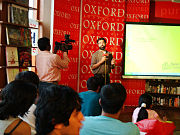- Oxford Bookstore
-
The Oxford Bookstore formerly known as Oxford Bookstore and Stationery Company is an Indian book store-chain established in 1920 by the Primlani family, a Sindhi business house who were pioneers in book wholesaling in India. It has no connection with Oxford University Press. Its outlets, on prime locations in the high streets of most of the major cities of the Raj such as Delhi, Mumbai, Meerut, Chennai (2006)[1] and Calcutta, are well known even today. Still known as the 'Oxford Bookstores, the outlets are now managed by the Apeejay Surrendra Group, a Calcutta-based conglomerate, while the book wholesaling business has been merged with India Book House to become Oxford and IBH. [2][3]
Contents
History
The Oxford Bookstore was a landmark in Calcutta during the days of the Raj, along with Whiteaway Laidlaw's famous departmental store. Like most bookshops of the time, the store also stocked fancy leather goods, toys, perfume, albums, photo frames, indoor games, playing cards and silver and electroplated goods. It features in the memoirs of many eminent British and Indian figures of the twentieth century, and has always played a part in the city's life. In the 1970s, during the Naxalite rising, it was used as a message drop-off point by activists, who would slip notes into particular books for other members of their group to find.
Use of the name 'Oxford'
Oxford University Press came to India in 1912, and learned of the existence of the Oxford Bookstores shortly after they were set up in 1920. They had a brief legal tussle over the use of the telegraphic address 'Oxonian', but in general tolerated and even encouraged the firm, giving them special terms for OUP and Clarendon Press titles. ‘An enterprising firm, certainly good at display,’ H.S. Milford, Publisher to the University, commented to Sir Maurice Gwyer.
OUP had in fact taken legal advice and been told that the geographical identifier ‘Oxford’ carried no protection unless teamed with ‘University’ or ‘Press’; and if any two words of the name were used they could ‘jump in with both feet’, as Milford said, and prosecute for trademark violation. The Press had been able to stifle the activities of the University of Oxford, Tennessee, without too much trouble, but marmalade, sausages and shoes could all call themselves ‘Oxford’ with impunity. Milford encouraged them because he felt their ‘enterprise’ deserved it, and since they were not publishers their operations actually helped OUP, and the confusion over who owned the Oxford Bookstores may have acted in OUP's advantage. Even today many people are surprised to know that these imposing, well-appointed and stately bookshops were never owned by OUP.
References
- ^ "Oxford bookstore opens shop". The Hindu. Oct 09, 2006. http://www.hindu.com/2006/10/09/stories/2006100914940200.htm.
- ^ "About us". http://www.oxfordbookstore.com/dotcom/oxford/about_us/#the_history.
- ^ "Oxford Bookstore to expand chain". Business Line. Oct 10, 2006. http://www.thehindubusinessline.com/2006/10/10/stories/2006101003100500.htm.
External links
International Former international Nation-wide (country) Barnes & Noble (us) · Books-A-Million (us) · National Bookstores (ph) · Dokya (th) · Indigo Books and Music (ca) · Blackwell UK (uk) · Libro (jp) · Suomalainen Kirjakauppa (fi) · Eslite Bookstore (tw) · Gunung Agung (id) · Oxford Bookstore (in)Defunct (country) B. Dalton (us) · Waldenbooks (us)See also List of bookstore chains (including local ones) Categories:
Categories:- Bookstores of India
- Companies established in 1920
- Companies based in Kolkata
Wikimedia Foundation. 2010.

